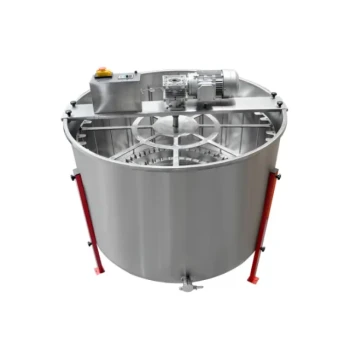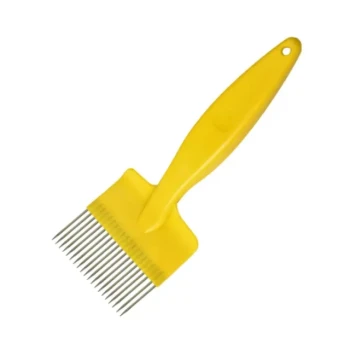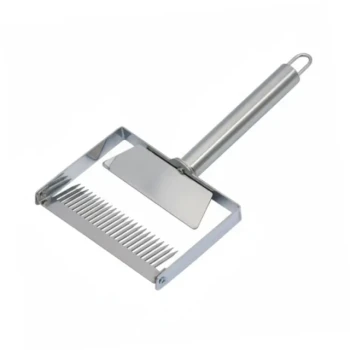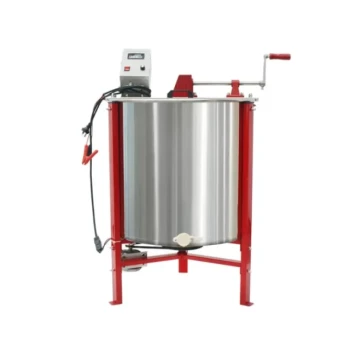To harvest honey, you need a specific set of tools designed to remove honey from the comb, filter out impurities, and store it safely. The core equipment includes an uncapping tool to open the wax cells, a honey extractor to spin the honey out via centrifugal force, a strainer to filter wax and debris, and food-grade containers for collection and storage. The scale of your operation will determine whether you need simple hand tools or more automated, high-volume machinery.
The challenge of honey harvesting is not simply acquiring a list of tools, but understanding which pieces are essential for your specific goals. Your choice of equipment hinges on a balance between your budget, the scale of your apiary, and your commitment to producing high-quality, stable honey.
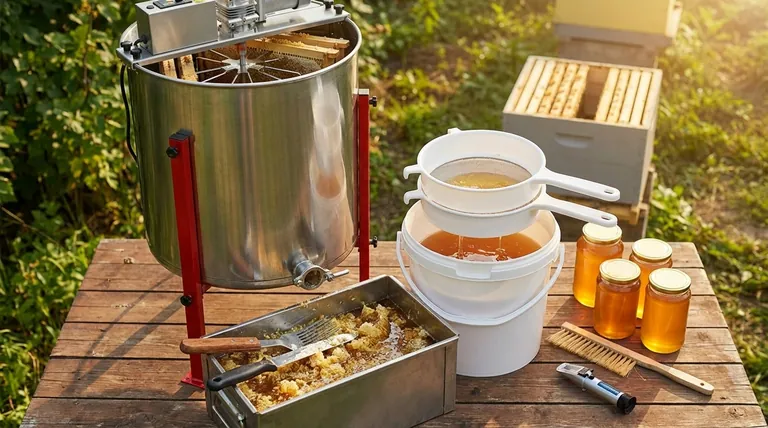
The Core Harvesting Workflow: From Hive to Jar
The process of harvesting honey can be broken down into a logical sequence of steps, each requiring specific tools. Understanding this workflow helps clarify why each piece of equipment is necessary.
Step 1: Removing Bees from the Frames
Before you can work with the honeycomb, you must safely and gently remove the bees. While methods like fume boards or bee escapes are also used, the most direct tool is a bee brush.
A bee brush has long, soft bristles designed to sweep bees off the comb without injuring them. This is typically done frame by frame as you remove them from the super (the honey box on the hive).
Step 2: Uncapping the Honeycomb
Bees seal their finished, cured honey in hexagonal wax cells with a protective wax capping. To release the honey, you must first remove these cappings.
An uncapping knife is the primary tool for this job. These can be electric or steam-heated to melt through the wax cleanly, or they can be simple "cold" serrated knives. A long bread knife can serve as a budget-friendly alternative for small-scale harvests. An uncapping fork or scratcher is also used to pierce cappings in lower-lying areas of the comb that the knife might miss.
Step 3: Extracting the Honey
Once the cells are open, you need to get the honey out of the comb without destroying the comb itself. This is the job of the honey extractor.
A honey extractor is a drum that holds the frames and spins them at high speed. The centrifugal force slings the liquid honey out of the cells and onto the wall of the drum, where it drips down to a collection gate at the bottom. Extractors can be small, hand-cranked models that hold two to four frames, or large, motorized radial extractors that can process dozens of frames at once.
Step 4: Straining and Clarifying
The raw honey collected from the extractor will contain small particles of beeswax, propolis, and other hive debris. This must be filtered out for a clean, clear final product.
A honey strainer or filter is used for this purpose. Most beekeepers use a double-sieve system, with a coarse mesh on top to catch large particles and a finer mesh below to clarify the honey. These are designed to fit securely over the top of a standard five-gallon bucket.
Step 5: Storing the Harvest
Proper storage is critical to preserve the quality of your honey. The right containers prevent contamination and make bottling or future use much easier.
Food-grade containers are non-negotiable. For initial collection and bulk storage, five-gallon plastic buckets with sealable lids (often called "honey buckets") are the standard. For bottling and sales, beekeepers use glass jars or smaller, food-grade plastic containers. Never use second-hand containers that held other substances, as this risks contaminating your entire harvest.
Ensuring Quality: The Professional's Toolkit
Simply extracting honey is one thing; ensuring it is of high quality and will not spoil is another. This requires moving beyond basic extraction and into quality control.
The Critical Role of Moisture Content
If honey is harvested before the bees have sufficiently dehydrated it, its moisture content will be too high. Honey with moisture content above ~18.6% is at high risk of fermenting, leading to a spoiled, unsellable product.
Using a Honey Refractometer
A honey refractometer is a specialized optical instrument that measures the moisture content of honey. By placing a single drop of honey on the prism, a beekeeper can instantly read its water percentage, ensuring it is within the safe, stable range (typically 16-18%). This tool is the single best way to guarantee your honey is "ripe" and ready for harvest.
Understanding the Trade-offs
The right equipment for you depends entirely on your context. What is essential for a commercial operation is overkill for a backyard hobbyist.
Hobbyist vs. Commercial Scale
A hobbyist with one or two hives can succeed with a simple uncapping knife, a two-frame manual extractor, and a bucket-and-sieve setup. A commercial beekeeper managing hundreds of hives requires automated uncapping machines and large, motorized radial extractors to process the high volume of frames efficiently.
To Buy or to Rent?
A honey extractor is often the most expensive piece of equipment for a new beekeeper. Since a first-year hive may not even produce a harvestable surplus, it is often wise to delay this purchase. Many local beekeeping clubs and associations offer extractors for rent, allowing you to process your first few harvests with minimal initial investment.
Optional but Helpful Equipment
While not strictly essential, some tools make the process easier. A queen excluder, a grid placed between the brood box and the honey supers, keeps the queen from laying eggs in the honey frames, simplifying the harvest. An uncapping tank is a dedicated basin that holds frames and collects the wax cappings and dripping honey, keeping your workspace much cleaner.
Making the Right Choice for Your Goals
Your equipment strategy should align directly with your beekeeping ambitions.
- If your primary focus is your first small-scale harvest: Start by renting an extractor and purchasing the essentials: an uncapping fork or knife, a double sieve, and two food-grade five-gallon buckets.
- If your primary focus is scaling up your operation: Your first major investment should be a quality multi-frame honey extractor suited to your anticipated hive count.
- If your primary focus is producing premium, high-quality honey: A honey refractometer is a non-negotiable investment to guarantee perfect moisture content and prevent fermentation.
Equipping yourself correctly is the first step toward a successful and rewarding honey harvest.
Summary Table:
| Equipment | Primary Function | Key Consideration |
|---|---|---|
| Uncapping Knife/Fork | Opens wax cells to release honey | Electric/heated for efficiency; serrated for budget |
| Honey Extractor | Spins honey out via centrifugal force | Manual for small scale; motorized radial for commercial |
| Honey Strainer | Filters wax and debris from honey | Double-sieve system for best clarity |
| Food-Grade Containers | Stores honey safely | 5-gallon buckets for bulk; jars for bottling |
| Honey Refractometer | Measures moisture content to prevent fermentation | Essential for quality control and premium honey |
| Bee Brush | Gently removes bees from frames | Soft bristles to avoid harming bees |
Ready to Equip Your Apiary for a Successful Harvest?
At HONESTBEE, we supply commercial apiaries and beekeeping equipment distributors with the high-quality, durable tools needed for efficient honey harvesting. Whether you're scaling up your operation or seeking premium equipment for superior honey quality, our wholesale-focused operations ensure you get the right gear at competitive prices.
Let us help you streamline your harvest:
- For Commercial Beekeepers: High-volume extractors and automated uncapping systems
- For Distributors: Reliable wholesale supply of essential harvesting equipment
- For Quality-Focused Operations: Precision refractometers and professional-grade tools
Contact HONESTBEE today to discuss your specific equipment needs and discover how our solutions can enhance your honey production efficiency and profitability.
Visual Guide
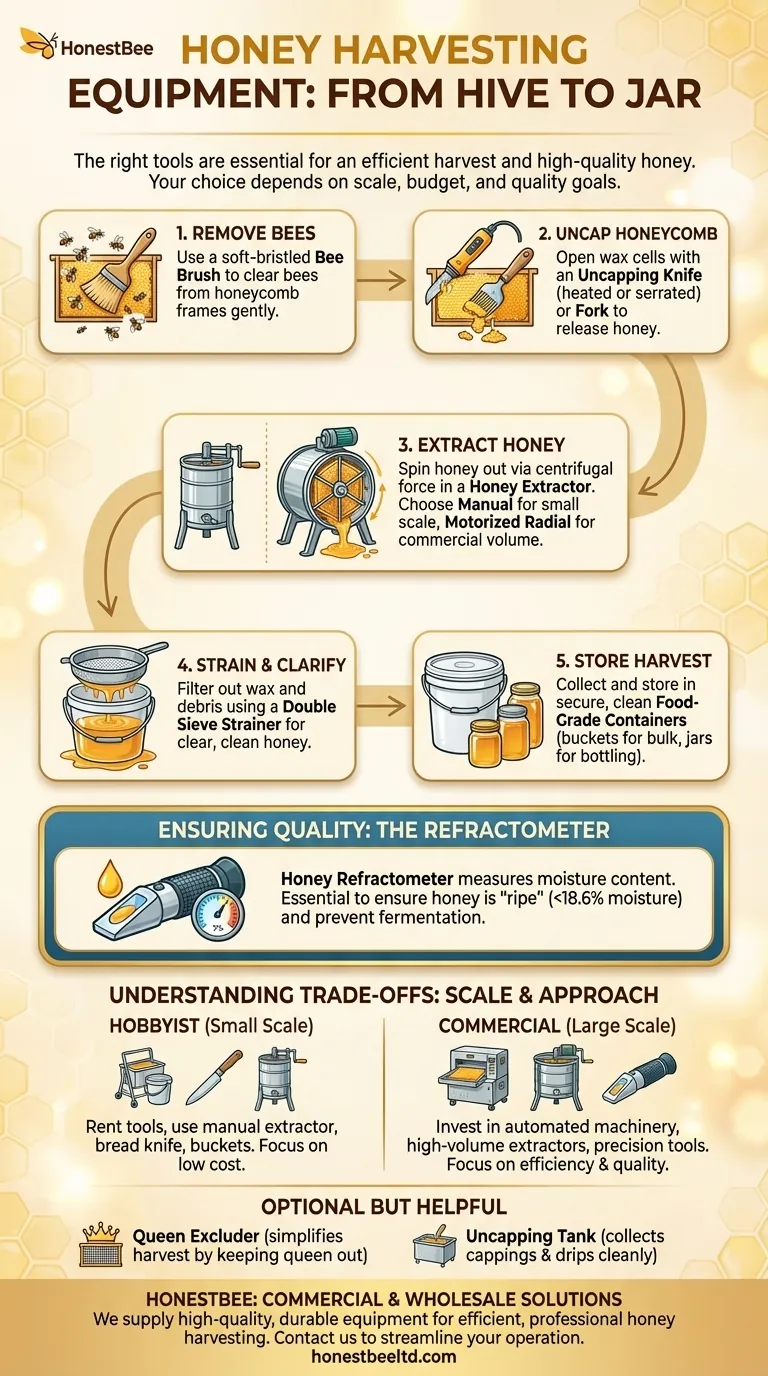
Related Products
- Electric 8 Frame Honey Spinner Extractor Equipment for Beekeeping
- HONESTBEE 3-Frame Manual Acrylic Honey Extractor
- Stainless Steel 3 Frame Manual Honey Extractor Spinner for Bee Honey Extraction
- HONESTBEE 72 Frame Industrial Electric Honey Extractor for Beekeeping
- 8-Frame Electric Self-Reversing Honey Extractor Spinner for Commercial Honey Extraction Equipment
People Also Ask
- Why is the centrifugal honey extractor essential for production? Boost Yield with Non-Destructive Technology
- How do industrial centrifugal honey extractors facilitate harvesting? Boost Yield and Efficiency with HONESTBEE
- Can you extract honey without an extractor? Yes, with these simple, low-cost methods.
- How do you extract honey from a beehive? A Guide to Efficient & Bee-Friendly Methods
- What is a honey extractor? The Key to Sustainable, High-Yield Beekeeping
- How do centrifugal honey extractors optimize the reuse of biological consumables? Boost Apiary Yield & Save Wax Assets
- What are the technical advantages of industrial centrifugal honey extractors? Maximize Yields and Protect Your Combs
- What is the primary role of a Spinning Extractor in the honey extraction process? Maximize Yield & Save Honeycombs








